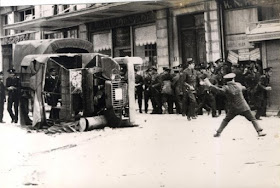When Greek solidarity over Cyprus Independence broke the post war defeat of the Left on the streets of Athens Part Two
Whites and Mau Mau

Banner reads ‘Disgraceful Americans’ Revenge for the Defeat of the Civil War? | Τ. ΤΡΙΚΚΑΣ, ΕΔΑ 1951-1967 (Αθήνα 2009)
The post war Left was hounded severely being in prisons and on islands with prisons and the irony of the situation is that it ended up on the street with the forces of the ‘nationalist’ far right over Cyprus, not unlike our era today.
In the name of the struggle against British imperialism, traditional ideologies ( of the alleged ‘superiority’ of the Greek nation) was legalized as an example of ‘deflected’ anti-imperialismm.
We read in a banner that the Cypriots aren’t ‘Mau Mau’ (27.10.1955) openly condemning the anticolonial guerrilla movement of Kenya, militant yes but not up to the standards of the white race and its thousand odd year history.
Even more complicated was the relativisation of the dividing line between resistance and being a quisling something which divided people in a blood line previously.
It’s ironic that the Left (EDA United Democratic Left) supported electorally in Arkadia a quisling politician of the 3rd Reich against the supporters of the national sellout Karamanlis – Cyprus being the key here.
Irony of the situation is that those people who under the 3rd Reich had publically declared their support of the legality of the occupier thought their position was justified “It was considered a heresy then that if you though that it wasn’t necessary for us to burn our hut for the sake of England’ wrote Pavlos Palaiologos the day after they deposed Makarios (Vima 11.3.1956).
“But we burnt it. Then liberation came. Everyone was happy. But we had the December events and then the gangsterous war (referring to civil war) a product of all the resistance which England inspired and England funded”….
The issue of our times is that in order to keep Turkey in NATO whilst at the same time supporting moves towards an a controlled Independent Kurdistan (ie break up of Turkey) the NWO wants to offer up the Aegean sea bed as a quid pro quo to Turkey and the only way of doing that is legitimising the Turkish occupation of Cyprus. If the the first three decades of the NWO inaugurated by Bush senior in 1990 could not do it, it seems pretty impossible to occur under a Trump administration as all the indications are this administration is in a geostrategic retreat and May recent attemps at currying favour with Erdogan will fall on deaf ears.
Note of the translator VN Gelis
Throughout the 1950’s Britain’s world Empire was under question having faced a geostrategic defeat during WW2 when ti was forced to hand over its world role to the ascending US Empire. As such India’s Independence started decolonisation in Asia and the same processes occurred in Africa with Ghanas independence leading onto Kenya’s and Northern Rhodesia’s (current Zambia). It was inevitable for the same process to occur in Cyprus from military men who had been England’s and Germany’s quislings during WW2.
The man who led EOKA (Cyprus liberation struggle movement) Grivas (note below) played a role during the December events in Athens killing partisans on behalf of Churchill as his anti-communism took precedent over everything else.
Britain’s insistence on maintaining Cyprus was due to the military bases there which can oversee the Arab world and as such they would try to maintain them tooth as nail as they did. Cypriot Turks on the islands did not participate in the liberation movement it was Greek affair under the slogan of ‘Enosis’ (union) with Greece. Once the English realised they couldn’t militarily defeat EOKA without flooding the island with tens of thousands of troops (when decommissioning was all the rage from Empire in the period of time) they resorted to their well known ‘divide and rule’ tactics by supporting the small Cypriot Turkish community and they created via the London and Zurich treaties equal status for this community bringing in Turkey to the game, proving always there are no allies in war amongst nations (Turkey did not participate in the Allied war against Hitler) creating a ‘constitutional monstrosity’ with respect to the Cypriot Constitution in the words of the General Secretary of the United Nations Galo Plaza…
By 1958 the Greek Left became the official opposition gaining 25% of the votes with EDA (union of Democratic Left) and by 1960 building workers through violent confrontations could bring down governments. The civil war and the defeat of the Left was a but a memory. The struggle for Cypriot independence contributed to that....
On Grivas
During the 3rd Reichs Occupation of Greece, there was a General called Grivas who was part of the 3rd Reichs Occupation forces having served in the Greek Army in both the invasion of Ataturks Turkey and the defence of Greece after the Axis invasion led by Italy he set up a paramilitary organisation called X (Hites) who spent their time crushing communist led partisans. He was from Cyprus and led the Cypriot armed independence struggle against the British Empire for Enosis between Cyprus and Greece. In that conflict he ended up in conflict with the collapsing British Empire. Its ironic how Velouhiotis and Makarios died at the hands of the British whilst Grivas lived all the way to 1974.
https://en.wikipedia.org/wiki/Organization_X







